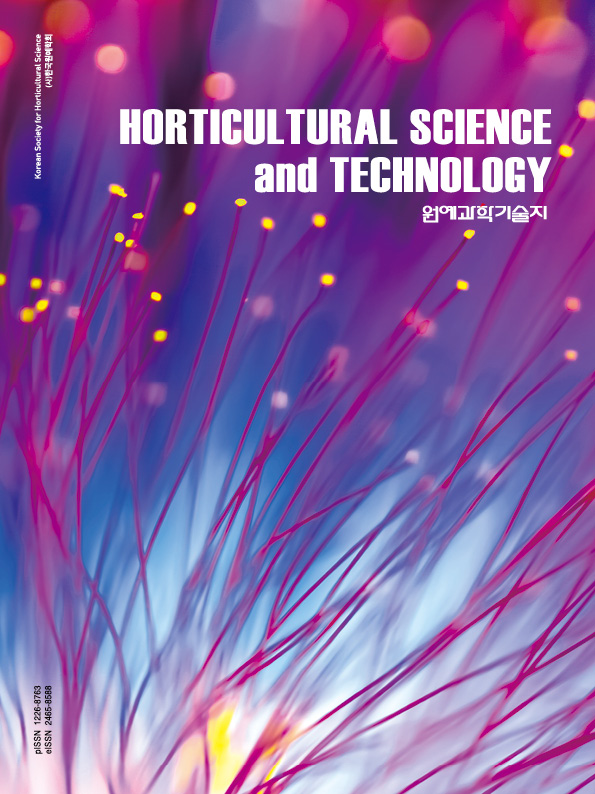Research Article
Abdel Latef AAH, Chaoxing H (2011) Arbuscular mycorrhizal influence on growth, photosynthetic pigments, osmotic adjustment and oxidative stress in tomato plants subjected to low temperature stress. Acta Physiol Plant 33:1217-1225. doi:10.1007/s11738-010-0650-3
10.1007/s11738-010-0650-3Adhikari D, Kobashi Y, Kai T, Kawagoe T, Kubota K, Araki KS, Kubo M (2018) Suitable soil conditions for tomato cultivation under an organic farming system. J Agric Chem Environ 7:117. doi:10.4236/jacen.2018.73011
10.4236/jacen.2018.73011Alban LA, Vacharotayan S, Jackson TL (1964) Phosphorus availability in reddish brown Lateritic soils. I. Laboratory studies. Agron J 56:555-558. doi:10.2134/agronj1964.00021962005600060010x
10.2134/agronj1964.00021962005600060010xOfficial Methods of Analysis of AOAC International (AOAC) (1990) Official Methods of Analysis of AOAC International. 15th ed. AOAC International, Washington DC, USA
Official Methods of Analysis of AOAC International (AOAC) (2005) Official Methods of Analysis of AOAC International. 18th ed. AOAC International, Washington DC, USA
Arnon DI (1949) Copper enzymes in isolated chloroplasts. Polyphenoloxidase in Beta vulgaris. Plant Physiol 24:1. doi:10.1104/pp.24.1.1
10.1104/pp.24.1.116654194PMC437905Bae JE, Yun HK, Park KI, Suh SG (2023) Effects of starfish and lacquer tree by-product fertilizer on growth of tomato plants. Hort Sci Technol 41:370-378. doi:10.7235/HORT.20230034
10.7235/HORT.20230034Baker NR (2008) Chlorophyll fluorescence: a probe of photosynthesis in vivo. Annu Rev Plant Biol 59:89-113. doi:10.1146/annurev.arplant.59.032607.092759
10.1146/annurev.arplant.59.032607.09275918444897Bautista J, Hernández-Mendoza F, García-Gaytán V (2020) Impact on Yield, Biomass, Mineral Profile, pH, and Electrical Conductivity of Cherry Tomato Fruit Using a Nutrient Solution and a Silicon-Based Organomineral Fertilizer. Annu Rev Plant Biol 59:89-113. doi:10.1155/2020/8821951
10.1155/2020/8821951Bist V, Niranjan A, Ranjan M, Lehri A, Seem K, Srivastava S (2020) Silicon-solubilizing media and its implication for characterization of bacteria to mitigate biotic stress. Front Plant Sci 11:28. doi:10.3389/fpls.2020.00028
10.3389/fpls.2020.0002832194577PMC7061934Bona E, Todeschini V, Cantamessa S, Cesaro P, Copetta A, Lingua G, Gamalero E, Berta G, Massa N (2018) Combined bacterial and mycorrhizal inocula improve tomato quality at reduced fertilization. Sci Hortic 234:160-165. doi:10.1016/j.scienta.2018.02.026
10.1016/j.scienta.2018.02.026Brunetti G, Traversa A, De Mastro F, Cocozza C (2019) Short term effects of synergistic inorganic and organic fertilization on soil properties and yield and quality of plum tomato. Sci Hortic 252:342-347. doi:10.1016/j.scienta.2019.04.002
10.1016/j.scienta.2019.04.002Cantwell M (2000) Optimum procedures for ripening tomatoes. Management of fruit ripening 9:106-116. In JT Thompson and C Crisoto, eds, Fruit ripening and ethylene management. UC Postharvest Horticulture Series 9. University of California, Davis, USA, pp 106-116. http://postharvest.ucdavis.edu/files/93536.pdf
Cao B, Xu K, Shi J, Xin G, Liu C, Li X (2013) Effects of silicon on growth, photosynthesis and transpiration of tomato. J Plant Nutr Fertil 19:354-360
Clark FE (1965) Agar‐plate method for total microbial count. In AG Norman, ed, Methods of soil analysis: Part 2 chemical and microbiological properties, 9.2, pp 1460-1466. doi:10.2134/agronmonogr9.2.c48
10.2134/agronmonogr9.2.c48Costan A, Stamatakis A, Chrysargyris A, Petropoulos SA, Tzortzakis N (2020) Interactive effects of salinity and silicon application on Solanum lycopersicum growth, physiology and shelf-life of fruit produced hydroponically. J Sci Food Agric 100:732-743. doi:10.1002/jsfa.10076
10.1002/jsfa.1007631597201Coyago-Cruz E, Corell M, Moriana A, Hernanz D, Stinco CM, Meléndez-Martínez AJ (2017) Effect of the fruit position on the cluster on fruit quality, carotenoids, phenolics and sugars in cherry tomatoes (Solanum lycopersicum L.). Food Res Int 100:804-813. doi:10.1016/j.foodres.2017.08.002
10.1016/j.foodres.2017.08.00228873753Cumplido-Nájera CF, González-Morales S, Ortega-Ortíz H, Cadenas-Pliego G, Benavides-Mendoza A, Juárez-Maldonado A (2019) The application of copper nanoparticles and potassium silicate stimulate the tolerance to Clavibacter michiganensis in tomato plants. Sci Hortic 245:82-89. doi:10.1016/j.scienta.2018.10.007
10.1016/j.scienta.2018.10.007de Alvarenga JFR, Tran C, Hurtado-Barroso S, Martinez-Huélamo M, Illan M, Lamuela-Raventos RM (2017) Home cooking and ingredient synergism improve lycopene isomer production in Sofrito. Food Res Int 99:851-861. doi:10.1016/j.foodres.2017.01.009
10.1016/j.foodres.2017.01.00928847422Delauney AJ, Verma DPS (1993) Proline biosynthesis and osmoregulation in plants. Plant J 4:215-223. doi:10.1046/j.1365-313X.1993.04020215.x
10.1046/j.1365-313X.1993.04020215.xDiouf IA, Derivot L, Bitton F, Pascual L, Causse M (2018) Water deficit and salinity stress reveal many specific QTL for plant growth and fruit quality traits in tomato. Front Plant Sci 9:279. doi:10.3389/fpls.2018.00279
10.3389/fpls.2018.0027929559986PMC5845638Dudás A, Szalai Z, Vidéki E, Wass-Matics H, Kocsis T, Végvári G, Kotroczó Z, Biró B (2017) Sporeforming bacillus bioeffectors for healthier fruit quality of tomato in pots and field. Appl Ecol Environ Res 15:1399-1418. doi:10.15666/aeer/1504_13991418
10.15666/aeer/1504_13991418El-Esawi MA, Alaraidh IA, Alsahli AA, Alamri SA, Ali HM, Alayafi AA (2018) Bacillus firmus (SW5) augments salt tolerance in soybean (Glycine max L.) by modulating root system architecture, antioxidant defense systems and stress-responsive genes expression. Plant Physiol Biochem 132:375-384. doi:10.1016/j.plaphy.2018.09.026
10.1016/j.plaphy.2018.09.02630268029Flores P, Hernández V, Hellín P, Fenoll J, Cava J, Mestre T, Martínez V (2016) Metabolite profile of the tomato dwarf cultivar Micro-Tom and comparative response to saline and nutritional stresses with regard to a commercial cultivar. J Sci Food Agric 96:1562-1570. doi:10.1002/jsfa.7256
10.1002/jsfa.725625974114George JF (2004) The theory of planned behavior and Internet purchasing. Internet Res 14:198-212. doi:10.1108/10662240410542634
10.1108/10662240410542634Gharbi F, Zribi L, Daly AB, Rejeb S, Hanchi B (2018) Photosynthetic responses of tomato leaves to salt and cadmium stresses: growth and chlorophyll a fluorescence kinetic analyses. Pol Environ Stud 27:1-10. doi:10.15244/pjoes/81066
10.15244/pjoes/81066Ghorbani A, Razavi SM, Ghasemi Omran VO, Pirdashti H (2018) Piriformospora indica inoculation alleviates the adverse effect of NaCl stress on growth, gas exchange and chlorophyll fluorescence in tomato (Solanum lycopersicum L.). Plant Biology 20:729-736. doi:10.1111/plb.12717
10.1111/plb.1271729575688Go Y, Lee BS, Kim EJ, Ju SH, Park JS, Na H (2023) Chlorella foliar application promote growth and post-harvest storage characteristics in melon. Hort Sci Technol 41:549-559. doi:10.7235/HORT.20230047
10.7235/HORT.20230047Gremli HA (1974) Interaction of flavor compounds with soy protein. J Am Oil Chem Soc 51:95A-97A. doi:10.1007/BF02542100
10.1007/BF02542100Hayat S, Hayat Q, Alyemeni MN, Wani AS, Pichtel J, Ahmad A (2012) Role of proline under changing environments: a review. Plant Signal Behav 7:1456-1466. doi:10.4161/psb.21949
10.4161/psb.2194922951402PMC3548871Helyes L, Dimény J, Pék Z, Lugasi A (2006) Effect of the variety and growing methods as well as cultivation conditions on the composition of tomato (Lycopersicon lycopersicum (L.) Karsten) fruit. Acta Hotic 712:511-516. doi:10.17660/ActaHortic.2006.712.62
10.17660/ActaHortic.2006.712.62Hong SS, Xu DQ (1999) Light-induced increase in initial chlorophyll fluorescence Fo level and the reversible inactivation of PS II reaction centers in soybean leaves. Photosynth Res 61:269-280. doi:10.1023/A:1006357203466
10.1023/A:1006357203466Hu W, Su Y, Yang R, Xie Z, Gong H (2023) Effect of foliar application of silicon and selenium on the growth, yield and fruit quality of tomato in the field. Horticulturae 9:1126. doi:10.3390/horticulturae9101126
10.3390/horticulturae9101126Hwang J (2000) Mineralogy and chemical composition of the residual soils (Hwangto) from South Korea. J Miner Soc Korea 13:147-163
Jo GW, Kim YS, Ham SK, Bae EJ, Lee JP, Kim DH, Kim WS, Lee GJ (2017) Microbial fertilizer containing Lactobacillus fermentum improved creeping bentgrass density. Weed Turf Sci 6:322-332. doi:10.5660/WTS.2017.6.4.322
10.5660/WTS.2017.6.4.322Jung J, Choi S, Hong H, Sung JS, Park W (2014) Effect of red clay on diesel bioremediation and soil bacterial community. Microb Ecol 68:314-323. doi:10.1007/s00248-014-0420-7
10.1007/s00248-014-0420-724743885Jung J, Jang I, Ahn S, Shin B, Kim J, Park C, Jee SC, Sung JS, Park W (2015) Molecular Mechanisms of Enhanced Bacterial Growth on Hexadecane with Red Clay. Microb Ecol 70:912-921. doi:10.1007/s00248-015-0624-5
10.1007/s00248-015-0624-525956940Kalayu G (2019) Phosphate solubilizing microorganisms: Promising approach as biofertilizers. Int J Agron 2019:4917256. doi:10.1155/2019/4917256
10.1155/2019/4917256Kaloterakis N, van Delden SH, Hartley S, De Deyn GB (2021) Silicon application and plant growth promoting rhizobacteria consisting of six pure Bacillus species alleviate salinity stress in cucumber (Cucumis sativus L). Sci Hortic 288:110383. doi:10.1016/j.scienta.2021.110383
10.1016/j.scienta.2021.110383Kang SC, Yang MO, Tae UH (2001) Mechanism of free phosphate production by Penicillium sp. GL-101, phosphate solubilizing fungus, in the submerged culture. Korean J Environ Agric 20:1-7
Kaur H, Bedi S, Sethi VP, Dhatt AS (2018) Effects of substrate hydroponic systems and different N and K ratios on yield and quality of tomato fruit. J Plant Nutr 41:1547-1554. doi:10.1080/01904167.2018.1459689
10.1080/01904167.2018.1459689Khadivi-Khub A (2015) Physiological and genetic factors influencing fruit cracking. Acta Physiol Plant 37:1-14. doi:10.1007/s11738-014-1718-2
10.1007/s11738-014-1718-2Khan M, Zaidi A, Ahmad E (2014) Mechanism of phosphate solubilization and physiological functions of phosphate-solubilizing microorganisms. In Musarrat J ed, Phosphate Solubilizing Microorganisms. Spinger, Cham, pp 31-62. doi:10.1007/978-3-319-08216-5_2
10.1007/978-3-319-08216-5_2Kim Y, Bae JR, Kim CB, Roh Y (2014) Pedological andmMineralogical characterizations of hwangto (Yellow Residual Soils), Naju, Jeollanam-do, Korea. Econ Environ Geol 47:87-96. doi:10.9719/EEG.2014.47.2.87
10.9719/EEG.2014.47.2.87Kirk PL (1950) Kjeldahl method for total nitrogen. Anal chem 22:354-358. doi:10.1021/ac60038a038
10.1021/ac60038a038Kitajima M, Butler W (1975) Quenching of chlorophyll fluorescence and primary photochemistry in chloroplasts by dibromothymoquinone. Biochimica et Biophysica Acta (BBA)-Bioenergetics 376:105-115. doi:10.1016/0005-2728(75)90209-1
10.1016/0005-2728(75)90209-1Kumar A, Kumar A, Patel H (2018) Role of microbes in phosphorus availability and acquisition by plants. Int J Curr Microbiol Appl Sci 7:1344-1347. doi:10.20546/ijcmas.2018.705.161
10.20546/ijcmas.2018.705.161Kumar V, Kumar P, Khan A (2020) Optimization of PGPR and silicon fertilization using response surface methodology for enhanced growth, yield and biochemical parameters of French bean (Phaseolus vulgaris L.) under saline stress. Biocatal Agric Biotechnol 23:101463. doi:10.1016/j.bcab.2019.101463
10.1016/j.bcab.2019.101463Kurina AB, Solovieva AE, Khrapalova IA, Artemyeva AM (2021) Biochemical composition of tomato fruits of various colors. Vavilov J Genet Breed 25:514-527. doi:10.18699/VJ21.058
10.18699/VJ21.05834595374PMC8453365Le T, Pék Z, Takács S, Neményi A, Helyes L (2018) The effect of plant growth-promoting rhizobacteria on yield, water use efficiency and Brix Degree of processing tomato. Plant Soil Environ 64:523-529. doi:10.17221/818/2017-PSE
10.17221/818/2017-PSELee KK, Mok IK, Yoon MH, Kim HJ, Chung DY (2012) Mechanisms of phosphate solubilization by PSB (Phosphate-solubilizing Bacteria) in soil. Korean J Soil Sci Fert 45:169-176. doi:10.7745/KJSSF.2012.45.2.169
10.7745/KJSSF.2012.45.2.169Liang Y, Nikolic M, Bélanger R, Gong H, Song A, Liang Y, Nikolic M, Bélanger R, Gong H, Song A (2015) Effect of silicon on crop growth, yield and quality. In Y Liang, M Nikolic, R Bélanger, H Gong, A Song, eds, Silicon in Agriculture: From Theory to Practice: Springer, Netherlands, pp 209-223. doi:10.1007/978-94-017-9978-2_11
10.1007/978-94-017-9978-2_11Lichtenthaler HK (1987) Chlorophylls and carotenoids: pigments of photosynthetic biomembranes. Meth Enzymol 148:350-382. doi:10.1016/0076-6879(87)48036-1
10.1016/0076-6879(87)48036-1Lohar DP, Peat WE (1998) Floral characteristics of heat-tolerant and heat-sensitive tomato (Lycopersicon esculentum Mill.) cultivars at high temperature. Sci Hortic 73:53-60. doi:10.1016/S0304-4238(97)00056-3
10.1016/S0304-4238(97)00056-3Mahmood S, Daur I, Al-Solaimani SG, Ahmad S, Madkour MH, Yasir M, Hirt H, Ali S, Ali Z (2016) Plant growth promoting rhizobacteria and silicon synergistically enhance salinity tolerance of mung bean. Front Plant Sci 7:876. doi:10.3389/fpls.2016.00876
10.3389/fpls.2016.00876Malhotra H, Vandana, Sharma S, Pandey R (2018) Phosphorus nutrition: plant growth in response to deficiency and excess. In M Hasanuzzaman, M Fujita, H Oku, K Nahar, B Hawrylak-Nowak, eds, Plant Nutrients and Abiotic Stress Tolerance. Springer, Singapore, pp 171-190. doi:10.1007/978-981-10-9044-8_7
10.1007/978-981-10-9044-8_7Marsic NK, Vodnik D, Mikulic-Petkovsek M, Veberic R, Sircelj H (2018) Photosynthetic traits of plants and the biochemical profile of tomato fruits are influenced by grafting, salinity stress, and growing Season. J Agric Food Chem 66:5439-5450. doi:10.1021/acs.jafc.8b00169
10.1021/acs.jafc.8b0016929757634Mayak S, Tirosh T, Glick BR (2004) Plant growth-promoting bacteria confer resistance in tomato plants to salt stress. Plant Physiol Biochem 42:565-572. doi:10.1016/j.plaphy.2004.05.009
10.1016/j.plaphy.2004.05.00915246071Menrad K (2003) Market and marketing of functional food in Europe. J Food Eng 56:181-188. doi:10.1016/S0260-8774(02)00247-9
10.1016/S0260-8774(02)00247-9Montesdeoca-Flores D, Alfayate-Casañas C, Hernández-Bolaños E, Hernández-González M, Estupiñan-Afonso Z, Abreu-Acosta N (2024) Effect of biofertilizers and rhizospheric bacteria on growth and root ultrastucture of lettuce. Hortic, Environ, Biotechnol 65:15-28. doi:10.1007/s13580-023-00545-8
10.1007/s13580-023-00545-8Moon DG, Kim SH, Cho MW, Yu IH, Ryu HR, Lee EH (2015) Changes of fruit cracking percentage and fruit shape of 'Hei' black tomato with increased temperature. Korean J Agric For Meteorol 17:202-206. doi:10.5532/KJAFM.2015.17.3.202
10.5532/KJAFM.2015.17.3.202Naghmouchi K, Belguesmia Y, Bendali F, Spano G, Seal BS, Drider D (2020) Lactobacillus fermentum: a bacterial species with potential for food preservation and biomedical applications. Crit Rev Food Sci 60:3387-3399. doi:10.1080/10408398.2019.1688250
10.1080/10408398.2019.168825031729242National Institute of Agricultural Science and Technology (NIAST) (2010a) Analysis methods of soil and plant. National Institute of Agricultural Science. Rural Development Administration, Suwon, Korea
National Institute of Agricultural Science and Technology (NIAST) (2010b) Fertilizer application recommendations for crop plants. National Institute of Agricultural Science. Rural Development Administration, Suwon, Korea
Oliveira CA, Alves VMC, Marriel IE, Gomes EA, Scotti MR, Carneiro NP, Guimarães CT, Schaffert RE, Sá NMH (2009) Phosphate solubilizing microorganisms isolated from rhizosphere of maize cultivated in an oxisol of the Brazilian Cerrado Biome. Soil Biol Biochem 41:1782-1787. doi:10.1016/j.soilbio.2008.01.012
10.1016/j.soilbio.2008.01.012Oms-Oliu G, Hertog M, Van de Poel B, Ampofo-Asiama J, Geeraerd AH, Nicolai BM (2011) Metabolic characterization of tomato fruit during preharvest development, ripening, and postharvest shelf-life. Postharvest Biol Technol 62:7-16. doi:10.1016/j.postharvbio.2011.04.010
10.1016/j.postharvbio.2011.04.010Park M, Chung YS, Lee S (2017) Quality changes in tomato fruits caused by genotype and environment interactions. Hortic Sci Technol 35:361-372. doi:10.12972/kjhst.20170038
10.12972/kjhst.20170038Peet M (1992) Fruit cracking in tomato. Horttech 2:216-223. doi:10.21273/HORTTECH.2.2.216
10.21273/HORTTECH.2.2.216Peixoto J, Neto C, Campos L, Dourado W, Nogueira A, Nascimento A (2017) Industrial tomato lines: morphological properties and productivity. Genet Mol Res 16:1-15. doi:10.4238/gmr16029540
10.4238/gmr16029540Peris-Felipo FJ, Benavent-Gil Y, Hernández-Apaolaza L (2020) Silicon beneficial effects on yield, fruit quality and shelf-life of strawberries grown in different culture substrates under different iron status. Plant physiol biochem 152:23-31. doi:10.1016/j.plaphy.2020.04.026
10.1016/j.plaphy.2020.04.02632361399Pinedo-Guerrero ZH, Cadenas-Pliego G, Ortega-Ortiz H, González-Morales S, Benavides-Mendoza A, Valdés-Reyna J, Juárez-Maldonado A (2020) Form of silica improves yield, fruit quality and antioxidant defense system of tomato plants under salt stress. Agriculture 10:367. doi:10.3390/agriculture10090367
10.3390/agriculture10090367Prihastanti E, Subagyo A, Ngadiwiyana N (2018) Effect of combination of NPK and nano silica on the levels of β-carotene and nutritional value of corn (Zea mays L.). IOP Conf Ser: Mater 434:012117. doi:10.1088/1757-899X/434/1/012117
10.1088/1757-899X/434/1/012117Qu L, Huang Y, Zhu C, Zeng H, Shen C, Liu C, Zhao Y, Pi E (2016) Rhizobia-inoculation enhances the soybean's tolerance to salt stress. Plant Soil 400:209-222. doi:10.1007/s11104-015-2728-6
10.1007/s11104-015-2728-6Quinet M, Angosto T, Yuste-Lisbona FJ, Blanchard-Gros R, Bigot S, Martinez JP, Lutts S (2019) Tomato fruit development and metabolism. Front Plant Sci 10:1554. doi:10.3389/fpls.2019.01554
10.3389/fpls.2019.0155431850035PMC6895250Raiola A, Rigano MM, Calafiore R, Frusciante L, Barone A (2014) Enhancing the health-promoting effects of tomato fruit for biofortified food. Mediators Inflamm 2014:139873. doi:10.1155/2014/139873
10.1155/2014/13987324744504PMC3972926Rambla JL, Tikunov YM, Monforte AJ, Bovy AG, Granell A (2013) The expanded tomato fruit volatile landscape. J Exp Bot 65:4613-4623. doi:10.1093/jxb/eru128
10.1093/jxb/eru12824692651Rural Development Administration (RDA) (2012) Analysis standard for research in agricultural science and technology. Rural Development Administration, Jeonju, Korea
Ryu A, Hong JS, Kim S, Choi JH, Choi Y, Choi H (2019) Nutritional components and pigment characteristics of colored cherry tomatoes. Korean J Food Cook Sci 35:178-186. doi:10.9724/kfcs.2019.35.2.178
10.9724/kfcs.2019.35.2.178Salvioli A, Zouari I, Chalot M, Bonfante P (2012) The arbuscular mycorrhizal status has an impact on the transcriptome profile and amino acid composition of tomato fruit. BMC Plant Biol 12:1-12. doi:10.1186/1471-2229-12-44
10.1186/1471-2229-12-4422452950PMC3362744Sánchez‐Rodríguez E, Leyva R, Constán‐Aguilar C, Romero L, Ruiz JM (2012) Grafting under water stress in tomato cherry: improving the fruit yield and quality. Ann Appl Biol 161:302-312. doi:10.1111/j.1744-7348.2012.00574.x
10.1111/j.1744-7348.2012.00574.xSato S, Sakaguchi S, Furukawa H, Ikeda H (2006) Effects of NaCl application to hydroponic nutrient solution on fruit characteristics of tomato (Lycopersicon esculentum Mill.). Sci Hortic 109:248-253. doi:10.1016/j.scienta.2006.05.003
10.1016/j.scienta.2006.05.003Satyaprakash M, Nikitha T, Reddi E, Sadhana B, Vani SS (2017) Phosphorous and phosphate solubilising bacteria and their role in plant nutrition. Int J Curr Microbiol Appl Sci 6:2133-2144. doi:10.20546/ijcmas.2017.604.251
10.20546/ijcmas.2017.604.251Savvas D, Ntatsi G, Barouchas P (2017) Soil conservation, soil fertility and plant nutrition management. In Good Agricultural Practices for Greenhouse Vegetable Production in the South East European Countries. Principles for Sustainable Intensification of Smallholder Farms, Plant prodcuction paper 230, FAO, Rome, pp 53-79
Schmidt B, Domonkos M, Şumălan R, Biró B (2010) Suppression of arbuscular mycorrhiza's development by high concentrations of phosphorous at Tagetes patula L. Res Agric Sci 42:156-162
Seo Y, Gil B, Kyoung J, Yoo B, Chang Y, Yu S, Lee Y (2014a) Effect of environmetally-friendly red clay-processed materials on quality characteristics of eel. J Korean Soc Food Sci Nutr 43:287-292. doi:10.3746/jkfn.2014.43.2.287
10.3746/jkfn.2014.43.2.287Seo Y, Yang I, Yoon S, Kim S, Seo S, Won CI, Cho W, Lee S, Kang H, Yoon MY (2015) Evaluation of quality characteristics of Brassica campetris L. treated with environmentally-friendly red clay-processed materials. J Korean Soc Food Sci Nutr 44:732-738. doi:10.3746/jkfn.2015.44.5.732
10.3746/jkfn.2015.44.5.732Seo Y, Yoon S, Kim S, Cho W, Lee S, Kang HD, Yoon MY, Park J, Yoo B, Chang Y (2014b) Quality characteristics of radish treated with environmentally-friendly red clay-processed materials. J Korean Soc Food Sci Nutr 43:1394-1399. doi:10.3746/jkfn.2014.43.9.1394
10.3746/jkfn.2014.43.9.1394Shanthi V (2021) Actinomycetes: Implications and prospects in sustainable agriculture. Biofertil Stud Impact 335-370. doi:10.1002/9781119724995.ch11
10.1002/9781119724995.ch11Sheng L, Shen D, Luo Y, Sun X, Wang J, Luo T, Zeng Y, Xu J, Deng X, Cheng Y (2017) Exogenous γ-aminobutyric acid treatment affects citrate and amino acid accumulation to improve fruit quality and storage performance of postharvest citrus fruit. Food Chem 216:138-145. doi:10.1016/j.foodchem.2016.08.024
10.1016/j.foodchem.2016.08.02427596402Snowden CJ, Thomas B, Baxter CJ, Smith JAC, Sweetlove LJ (2015) A tonoplast Glu/Asp/GABA exchanger that affects tomato fruit amino acid composition. Plant J 81:651-660. doi:10.1111/tpj.12766
10.1111/tpj.1276625602029PMC4950293Solms J (1969) Taste of amino acids, peptides, and proteins. J Agric Food Chem 17:686-688. doi:10.1021/jf60164a016
10.1021/jf60164a016Strzałka K, Kostecka-Gugała A, Latowski D (2003) Carotenoids and environmental stress in plants: significance of carotenoid-mediated modulation of membrane physical properties. Russ J Plant Physiol 50:168-173. doi:10.1023/A:1022960828050
10.1023/A:1022960828050Sun J, Guo E, Yang X, Kong Y, Yang L, Liu H, Lin X (2023) Seasonal and spatial variations in soil biochemical properties in areas with different degrees of mining subsidence in Central China. Catena 224:106984. doi:10.1016/j.catena.2023.106984
10.1016/j.catena.2023.106984Tayade R, Ghimire A, Khan W, Lay L, Attipoe JQ, Kim Y (2022) Silicon as a smart fertilizer for sustainability and crop improvement. Biomolecules 12:1027. doi:10.3390/biom12081027
10.3390/biom1208102735892337PMC9332292Tyurin LV (1931) A new modification of the volumetric method of determining soil organic matter by means of chromic acid. Pochvovedenie 26:36-47
Ullah U, Ashraf M, Shahzad SM, Siddiqui AR, Piracha MA, Suleman M (2016) Growth behavior of tomato (Solanum lycopersicum L.) under drought stress in the presence of silicon and plant growth promoting rhizobacteria. Soil Environ 35:65-75
Vasil'eva IS, Vanyushkin SA, Zinov'eva SV, Udalova ZV, Bolychevtseva YV, Paseshnichenko VA (2003) Photosynthetic pigments of tomato plants under conditions of biotic stress and effects of furostanol glycosides. Appl Biochem Microbiol 39:606-612. doi:10.1023/A:1026290704338
10.1023/A:1026290704338Vu NT, Tran AT, Le TTC, Na JK, Kim SH, Park JM, Jang DC, Kim IS (2017) Improvement of tomato seedling quality under low temperature by application of silicate fertilizer. J Bio-Env Con 26:158-166. doi:10.12791/KSBEC.2017.26.3.158
10.12791/KSBEC.2017.26.3.158Walpola BC, Yoon MH (2012) Prospectus of phosphate solubilizing microorganisms and phosphorus availability in agricultural soils: A review. Afr J Microbiol Res 6:6600-6605. doi:10.5897/AJMR12.889
10.5897/AJMR12.889Wang M, Gao L, Dong S, Sun Y, Shen Q, Guo S (2017) Role of silicon on plant-pathogen interactions. Front in Plant Sci 8:701. doi:10.3389/fpls.2017.00701
10.3389/fpls.2017.0070128529517PMC5418358Weerahewa D, David D (2015) Effect of silicon and potassium on tomato anthracnose and on the postharvest quality of tomato fruit (Lycopersicon esculentum Mill.). J Natn Sci Foundation Sri Lanka 43:273-280. doi:10.4038/jnsfsr.v43i3.7959
10.4038/jnsfsr.v43i3.7959Xu X, Wang J, Wu H, Yuan Q, Wang J, Cui J, Lin A (2022) Effects of selenium fertilizer application and tomato varieties on tomato fruit quality: A meta-analysis. Sci Hortic 304:111242. doi:10.1016/j.scienta.2022.111242
10.1016/j.scienta.2022.111242Yang J, Park JH, Yoon YH, Ju JH (2020) Comparison of the high concentration calcium chloride (CaCl2) salt reduction effect of soil amendment agent and planting Pennisetum alopecuroides. Korean J Environ Ecol 34:345-354. doi:10.13047/KJEE.2020.34.4.345
10.13047/KJEE.2020.34.4.345Yang Z, Wu Z, Zhang C, Hu E, Zhou R, Jiang F (2016) The composition of pericarp, cell aging, and changes in water absorption in two tomato genotypes: mechanism, factors, and potential role in fruit cracking. Acta Physiol Plant 38:1-16. doi:10.1007/s11738-016-2228-1
10.1007/s11738-016-2228-1Yoo SJ, Lee S, Weon HY, Song J, Sang MK (2021) Assessment of rhizosphere microbial community structure in tomato plants after Inoculation of Bacillus species for inducing tolerance to salinity. Korean J Environ Agric 40:49-59. doi:10.5338/KJEA.2021.40.1.6
10.5338/KJEA.2021.40.1.6Yoon MY, Lee S, Choo JH, Jang H, Cho W, Kang H, Park JK (2016) Economical synthesis of complex silicon fertilizer by unique technology using loess. Korean J Chem Eng 33:958-963. doi:10.1007/s11814-015-0215-7
10.1007/s11814-015-0215-7Zhang C, Zhao Y, Jiang F, Wu Z, Cui S, Lv H, Yu L (2020) Differences of reactive oxygen species metabolism in top, middle and bottom part of epicarp and mesocarp influence tomato fruit cracking. The Journal of Hortic Sciand Biotechnol 95:746-756. doi:10.1080/14620316.2020.1748525
10.1080/14620316.2020.1748525- Publisher :KOREAN SOCIETY FOR HORTICULTURAL SCIENCE
- Publisher(Ko) :한국원예학회
- Journal Title :Horticultural Science and Technology
- Journal Title(Ko) :원예과학기술지
- Volume : 42
- No :4
- Pages :414-432
- Received Date : 2023-09-14
- Revised Date : 2024-01-22
- Accepted Date : 2024-02-01
- DOI :https://doi.org/10.7235/HORT.20240035


 Horticultural Science and Technology
Horticultural Science and Technology








